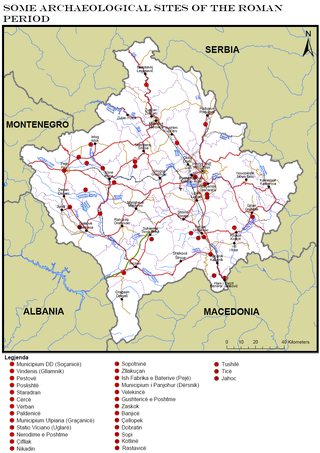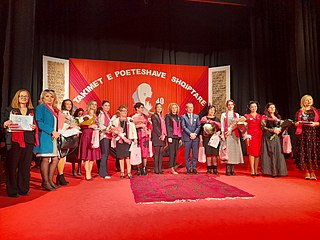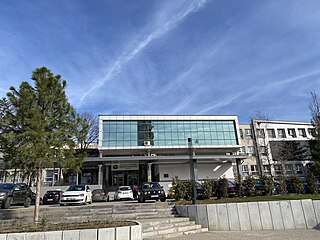
Stanford University Medical Center is a medical complex which includes Stanford Health Care and Stanford Children's Health. It is consistently ranked as one of the best hospitals in the United States and serves as a teaching hospital for the Stanford University School of Medicine. In 2022–23, it was ranked by the US News as the 3rd-best hospital in California and 10th-best in the country.
Conemaugh Health System, a member of Duke LifePoint Healthcare, is the largest health care provider in west central Pennsylvania, with multiple hospitals, physician offices, and outpatient centers in eleven counties. Conemaugh Health System is located in Johnstown, Pennsylvania.
Classical music in Kosovo refers to the art music cultivated in Kosovo. The roots of classical music in Kosovo are found in the 1940s and include the time period from the times when Kosovo was part of Yugoslavia to this day. It can be said that there is a tradition of classical music in Kosovo, however, compared to other Balkan countries and especially European countries this tradition is younger. Classical music in Kosovo reaches back about 70 years. Even though in a short period of time, this music has evolved, passing through generations of composers and artists. In his book Albanian: Zhvillimi i stileve në veprat e kompozitorëve shqiptarë të Kosovës, Engjëll Berisha comments:
"The diversity of styles in Albanian music [of Kosovo], its national patterns with sound idea-aesthetic foundations are a characteristic of the European musical reality, so many many works are of interest abroad, too, because during this relatively short period Albanian classical music in Kosovo has compensated for the delay in its development."

The Roman heritage sites in Kosovo represent a multitude of monuments of material and spiritual culture, which reflect the Roman period in this region. Among them, a special place is occupied by those that represent the development of art, such as the plastic monuments that are more frequent, and at the same time occupy an important place, because with the presentation of figures in relief and with numerous inscriptions they speak to us enough for this period.

Viciana or Station Viciano was a Roman road station of unclear location, somewhere in Kosovo field.

The Bazaar of Prishtina, Kosovo, was the core merchandising center of the Old Prishtina since the 15th century, when it was built. It played a significant role in the physical, economic, and social development of Pristina. The Old Bazaar was destroyed during the 1950s and 1960s, following the modernization slogan of "Destroy the old, build the new". In its place, buildings of Kosovo Assembly, Municipality of Prishtina, PTT, and Brotherhood and Unity socialist square were built. Nowadays, instead of PTT building resides the Government of Kosovo building. Only few historical buildings, such as the Bazaar Mosque and ruins of the Bazaar Hammam have remained from the Bazaar complex. Since then, Prishtina has lost part of its identity, and its cultural heritage has been scattered.

In the past, Kosovo’s capabilities to develop a modern health care system were limited. Low GDP during 1990 worsened the situation even more. However, the establishment of the Faculty of Medicine in the University of Pristina marked a significant development in health care. This was also followed by launching different health clinics which enabled better conditions for professional development.
Marenglen Verli is an Albanian historian and scholar. Since 2009, he is a member of the Academy of Sciences of Albania.
Fatmir Dalladaku is a German cardiac surgeon of Albanian origin. He is best known for performing the first open-heart surgery in Kosovo, and for his pro bono work for patients from Kosovo, Albania and North Macedonia. He spent the biggest part of his professional career in Germany, beginning in 1989.

The National Institute of Public Health of Kosova (NIPHK) is the oldest and highest health, professional and scientific institution of Kosovo, which organizes, develops, supervises and implements public health policies in Kosovo. The NIPHK covers the entire territory of the Republic of Kosovo through its branches - Public Health Institutes (IPH) organized in these Regional Centers: Peja, Prizren, Mitrovica, Gjilan, Gjakova, Ferizaj.
Pajazit Nushi was a university professor, psychologist and scientific and social-political worker from Gjakova, Kosova. Member of the Academy of Sciences and Arts of Kosovo.
Zef Mirdita was an Albanian historian, university professor and academic from Prizren, Kosovo. He has made a significant contribution to the fields of Illyrology and Balkan studies.

The Gatherings of Poetesses in Vushtrri is an annual poetry festival of women and girls held in the city of Vushtrri in Kosovo, under the patronage of the city municipality. During the several decades of its existence, the Festival has awarded some of the most notable Kosovan and Albanian poetesses.

The Faculty of Philology is an academic unit within the University of Pristina. Established in 1988 after gaining independence from the Faculty of Philosophy, its roots can be traced back to the Higher Pedagogical School of Prishtina (1958) and the Faculty of Philosophy (1960).
Muhamet Pirraku (1944–2014), was Albanian historian and publicist from Kosovo.
Islam Krasniqi is a Kosovan didactician, educational theorist, and university professor.

Luciano Motroni was a general surgery physician who made a significant contribution in the field of education and professional advancement of medical personnel in Prizren, Kosovo.

The University of Gjakova "Fehmi Agani" - UGJFA is a public university located in Gjakova, Kosovo. It was originally established as a Higher Pedagogical School in 1967 and has since grown into a comprehensive university.
The University of Gjilan also known as University of Gjilan "Kadri Zeka" - UGJKZ is a public university located in Gjilan, Kosovo. It was originally established as a Pedagogical Academy in 1973 and has since grown into a modern university.











